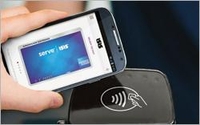 The long-promised, much-delayed mobile payment platform from the ISIS consortium of major carriers is now available nationwide. The NFC-powered proximity payment and
mobile wallet system is compatible with 40 “ISIS Ready” smartphones from AT&T, Verizon and T-Mobile, the group says. But customers will need to get a new SIM card installed by their
network provider in order to activate their devices for m-payment at participating merchants. The system is designed to work with the existing network of contactless payment terminals at thousands of
retail locations, including Toys ‘R Us, Jamba Juice, and Coca-Cola vending machines.
The long-promised, much-delayed mobile payment platform from the ISIS consortium of major carriers is now available nationwide. The NFC-powered proximity payment and
mobile wallet system is compatible with 40 “ISIS Ready” smartphones from AT&T, Verizon and T-Mobile, the group says. But customers will need to get a new SIM card installed by their
network provider in order to activate their devices for m-payment at participating merchants. The system is designed to work with the existing network of contactless payment terminals at thousands of
retail locations, including Toys ‘R Us, Jamba Juice, and Coca-Cola vending machines.
A locator site helps find nearby venues that should accept ISIS m-payments. In our search of the
local northern Delaware zip we found American Eagle Outfitters, CVS and Rite-Aid, BP gas stations. ISIS is also compatible with the American Express Serve that allows users to load funds onto the
payment card through multiple funding sources. An updated ISIS wallet app is available at Google Play. The ISIS site indicates that American Express and Chase bank cards are supported directly in the
app. Other payment methods can be loaded into the wallet via an AMEX Serve payment account that users can initiate.
In order to promote use of the m-payment platform, several retail
partners are offering special deals attached to ISIS. Users who load Coca-Cola's My Coke Rewards loyalty account into the wallet can get their first three drinks free at vending machines. Jamba Juice
is giving away 1 million smoothies to ISIS users. And Amex is offering 20% cash back to customers using its Serve platforms within the ISIS Wallet.
The national rollout comes after a number of
prolonged tests and delayed starts for the program. ISIS is notable among the many mobile payment schemes because of its reliance on NFC technology, which is present in only a fraction of smartphones,
and its consortium of network providers. The joint venture was formed several years ago by all but one of the top-tier providers in the U.S., AT&T, Verizon and T-Mobile. Sprint, which was the sole
and early supporter of Google Wallet, is the only absent top carrier.
Despite its heavyweight partnership, ISIS comes into a market that is fragmented across many payment solutions and growing
skepticism about NFC as an optimal m-payment solution. Alternative point-of-sale solutions from Square and PayPal, among many others, have achieved pockets of traction without NFC. Starbucks, which
some analysts credit with being the leading source of mobile payments in the U.S., relies on its own app-based scannable loyalty card for transactions. And Apple appears to be pursuing alternative
wallet and possible payment models that use Bluetooth LTE. Perhaps the most successful mobile wallet so far is the iOS Passbook app, and that doesn't even make payments yet.
NFC technology is
proliferating, especially among the high-end phones. Most of Samsung and Motorola's top-end models now sport the near field wireless chipset. Still, consumers will need to take that extra step of
having a new enhanced SIM card installed in order to make use of contactless payments. NFC technology in particular, but mobile wallets generally, have been criticized by some analysts for being a
solution without a problem -- namely, using debit and credit cards. Without considerable value adds attached to the mobile wallet itself, consumers seem unmotivated to turn their phones into credit
cards.